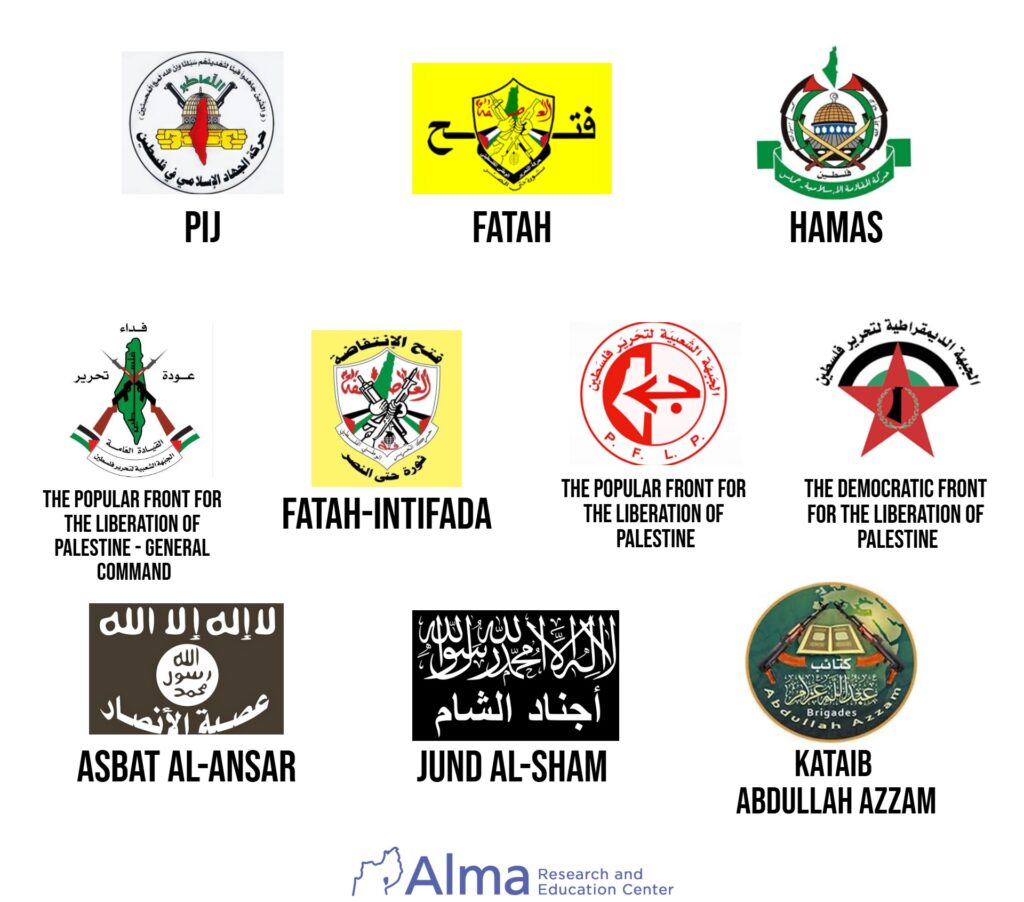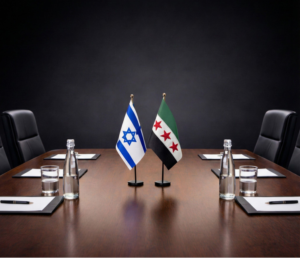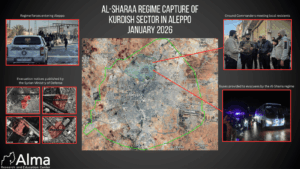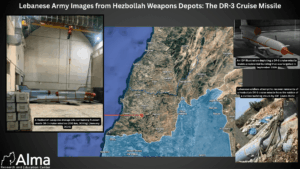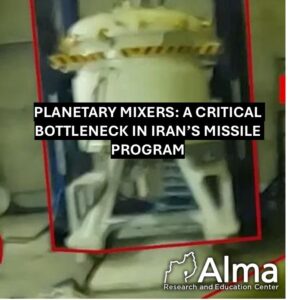longside the dialogue in Lebanon regarding disarming Hezbollah, there’s an equally intense discourse concerning the disarming of Palestinian organizations in Lebanon.
Hundreds of thousands of Palestinians reside in Lebanon, with various estimates ranging from approximately 200,000 to over 400,000. Due to political circumstances and the perpetuation of the refugee narrative, Palestinians in Lebanon do not receive citizenship. The vast majority are concentrated in 12 refugee camps across Lebanon, which serve as the hub of activity for armed Palestinian organizations.
Seven main Palestinian organizations operate in Lebanon, with the largest being Fatah (affiliated with the PLO – the Palestinian Authority under Mahmoud Abbas – Abu Mazen), Hamas, and Palestinian Islamic Jihad (PIJ). Additionally, the Popular Front for the Liberation of Palestine – General Command (which split from the Popular Front for the Liberation of Palestine), Fatah-Intifada, and the Democratic Front for the Liberation of Palestine also operate in Lebanon.
Furthermore, several extremist Salafi Islamic groups operate in the Palestinian refugee camps, such as Asbat al-Ansar, Jund al-Sham, Asbat al-Nour, Ansar Allah, Kataib Abdullah Azzam, and Asbat al-Islam.
All of these groups possess light to medium weaponry of various types, including an arsenal of rockets, anti-tank missiles, and the like. In addition, as we published in October 2021 in a special report regarding Hamas’s infrastructure and activity in Lebanon, Hamas also has an organized independent weapons manufacturing infrastructure in Lebanon, which includes the capability to produce rockets, UAVs, and even miniature explosive submarines.
The main and well-known Palestinian refugee camps are Rashidieh, Burj al-Shamali, and al-Bass in Tyre; Ain al-Hilweh and Mieh Mieh in Sidon; Shatila (currently also home to many Syrian refugees) and Burj al-Barajneh in Beirut; al-Baddawi and Nahr al-Bared in Tripoli; and the Jalil refugee camp in Beqaa – Baalbek.
The Fatah movement, considered the largest Palestinian organization in Lebanon, maintains a significant presence in the refugee camps in Tyre. Hamas holds a significant presence in the Ain al-Hilweh refugee camp in Sidon.
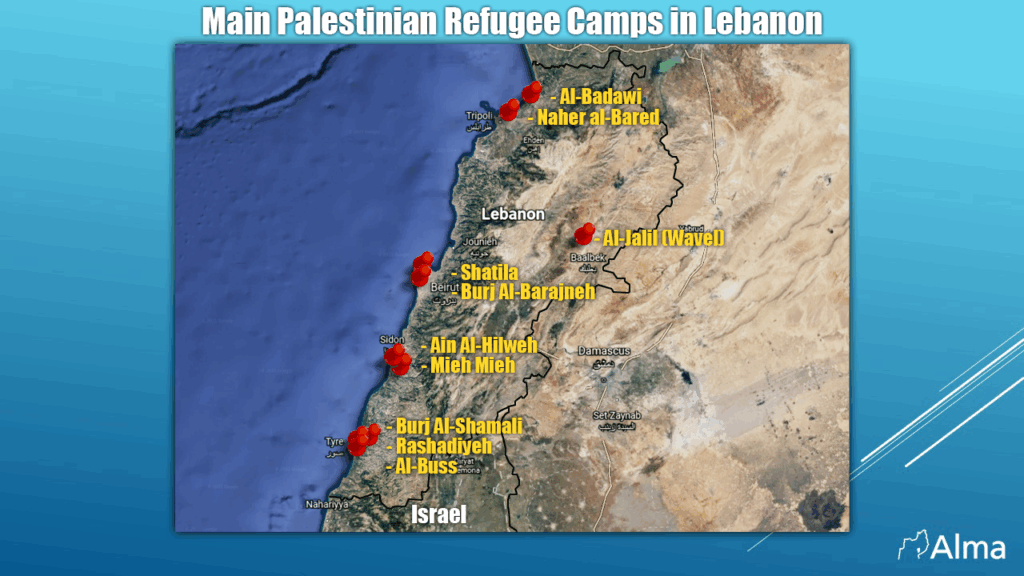
Lebanese security forces do not physically enter the Palestinian refugee camps, which have, over the years, become Palestinian extra-territories within Lebanon. Lebanese security forces maintain checkpoints outside the camps, at their main entry roads. De facto, the Lebanese state has no sovereignty within the refugee camps.
During the recent war, in coordination with Hezbollah, Hamas and PIJ operatives emerged from refugee camps in southern Lebanon and carried out terrorist activities against Israel, including infiltration attempts into Israeli territory and rocket fire. Even during the ceasefire, which began on November 27, 2024, terrorist activity against Israel continued. The last rocket fire towards Israel, carried out by Hamas operatives, occurred in March 2025. Hamas and PIJ sustained over 25 fatalities during the war.
During their meeting in April 2025, on the sidelines of the Arab Summit in Saudi Arabia, Lebanese President Joseph Aoun and Palestinian Authority President Mahmoud Abbas (Abu Mazen) discussed the disarmament of Palestinian factions in Lebanon. Abu Mazen expressed his support for this process and emphasized the Palestinian Authority’s commitment to helping Lebanon restore order and security.
On May 16, 2025, Abu Mazen made his first official visit to Lebanon in years. He met again with President Aoun and also with Prime Minister Nawaf Salam, who, among other things, stated that “Palestinian weapons in Lebanon have no value today” (May 26, 2025).
The meetings primarily focused on security issues related to illegal weapons in Palestinian refugee camps, the rights of Palestinians in Lebanon, and the need to improve relations between the Palestinian Authority and the Lebanese government.
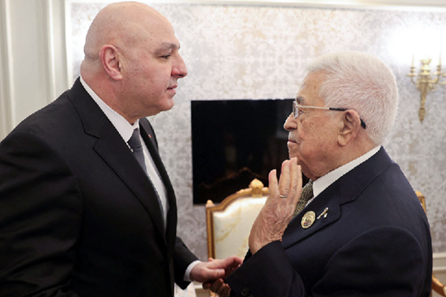
Following his meetings, Abu Mazen declared that “the era of weapons in Palestinian refugee camps in Lebanon is over. The time has come for Lebanese sovereignty to apply to all areas of the state, including the Palestinian camps.” He emphasized that the PLO and the Palestinian Authority do not support the possession of illegal weapons on Lebanese soil, and that all weaponry should be solely in the hands of state institutions.
In the wake of the visit, a joint Lebanese-Palestinian coordination committee was established. Its purpose is to synchronize the process of regulating weapons in the refugee camps and to set up a mechanism for their collection and surrender. The Lebanese side of the committee includes representatives from the Lebanese Ministry of Interior, the General Security Directorate, and Lebanese Army Intelligence. The Palestinian side includes senior representatives from the PLO Executive Committee, led by Azzam al-Ahmad. Also participating in the discussions are the head of Palestinian General Intelligence, Majed Faraj, his deputy, and the “Palestine” ambassador to Lebanon, Ashraf Dabour. A key objective for the Palestinian representatives is to bridge disagreements within the Fatah organization on this issue and to reach understandings with other Palestinian organizations.
According to various publications, the committee has decided on a timeline for the start of the weapon collection process in several Palestinian camps. This process is planned to be carried out in two phases:
Phase One – June 16, 2025:
- Shatila Camp – Beirut
- Burj al-Barajneh Camp – Beirut
- Mar Elias Camp – Beirut
Phase Two – July 1, 2025:
- Jalil Camp – Baalbek
- Rashidiyeh Camp – Tyre
- Al-Beddawi Camp – Tripoli
- Burj al-Shamali Camp – Tyre
- Al-Bass Camp – Tyre
The plan is for the collection of weapons to be carried out by local Palestinian entities within the camps, in coordination with the Lebanese army, and with security guarantees provided. It has been stated that those who do not cooperate with the decision may face cancellation of their residency permits in Lebanon and even deportation from the country.
At this stage, there has been no mention of Ain al-Hilweh camp (a stronghold of Hamas and Salafi movements) or Nahr al-Bared camp (which was severely damaged in 2007 during fighting between Palestinian organizations and the Lebanese army). These two camps are known as focal points for friction and terrorism. It remains unclear if or when the disarmament process will extend to them in the future.
It should be noted that on April 24, 2025, a preparatory process began in the al-Baddawi camp in Tripoli for a weapon collection and disarmament campaign. As part of this process, the Lebanese army closed all side roads leading to the al-Baddawi camp, leaving entry and exit only through the main gate. This was done to facilitate security oversight and prepare the ground for weapon collection. The move received support from the Fatah movement, which controls most of the camp, and is considered a first step towards disarming other camps in Lebanon.
As of June 3, 2025, there appears to be some difficulty in establishing the weapon collection mechanism, given the Palestinian representatives’ request to the committee for more time to complete its formation.
Following all the declarations about the swift implementation of the Palestinian weapons collection and disarmament initiative, is the process now showing signs of delay—or even a complete halt? And even if it proceeds, will the Palestinian organizations in Lebanon genuinely disarm?
On April 7, a rally took place in the city of Sidon in solidarity with the residents of the Gaza Strip. Attendees included religious leaders, activists, and representatives from the Islamic Jihad movement, Hamas, and Hezbollah. Among the messages voiced by the speakers was a call to oppose the demands for disarming the resistance organizations.

As of this writing, it appears that while the disarmament process geographically targets eight refugee camps across Lebanon, only the Fatah organization, represented by Abu Mazen, has, in principle, expressed its general agreement to the process. Even after coordination and agreements, it remains unclear whether groups within Fatah, on the one hand, and other Palestinian organizations, on the other, will hand over their weapons.
Regarding the Fatah organization, consider for instance Munir al-Maqdah, who commands an independent military force and effectively controls the center of the Ain al-Hilweh refugee camp through his operatives, wielding significant influence over activities there.
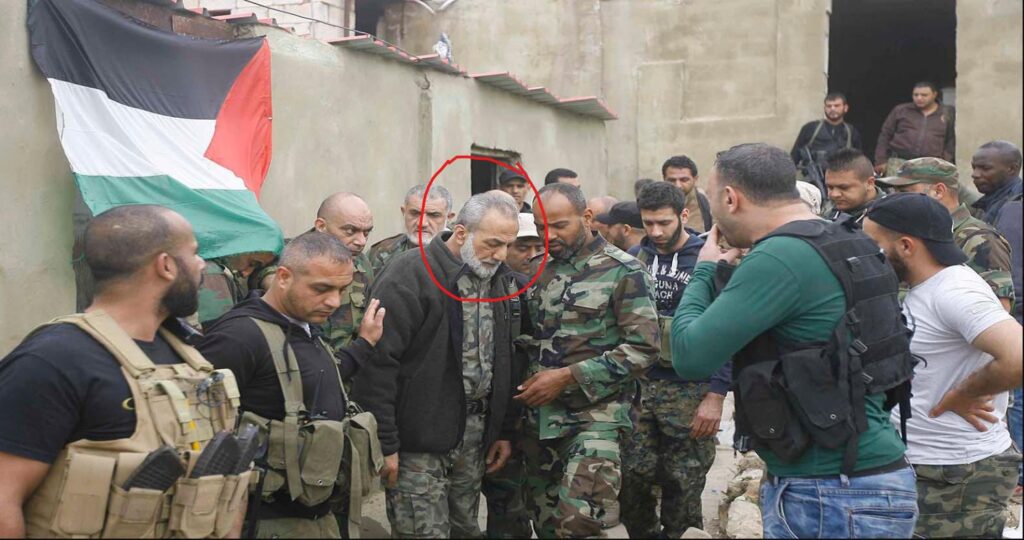
On March 25, 2024, Israeli security services, including the Shin Bet (ISA) and the IDF, successfully intercepted a shipment of advanced Iranian weapons being smuggled from Jordan. These weapons were intended for terror operatives in Judea and Samaria. Al-Maqdah was implicated in this smuggling operation, having assisted the Iranian forces behind it. (Unit 4000 – the special operations department of the IRGC Intelligence Organization, and Unit 18840 of the Quds Force’s special operations unit, which was then active in Syria, under Unit 840). Al-Maqdah has been known for years through his collaboration with Hezbollah and the Iranian Revolutionary Guard Corps. Will al-Maqdah surrender his weapons? We are not at all sure.
Additionally, this issue becomes particularly acute given that it’s unclear whether other organizations, especially Hamas, will join the initiative at all.
Extradition and Arrest of Hamas Operatives Following March 2025 Rocket Fire
On May 4 and 5, Lebanese army intelligence forces arrested five Hamas operatives after they confessed to involvement in the rocket fire towards Israel on March 22 and 28, 2025, as well as planning another attack. The arrests were carried out in coordination with the Hamas leadership, which handed over the suspects to the army.
This is an unusual step, but it is possible that, from Hamas’s cost-benefit perspective, they thought it preferable to hand them over and thereby defuse the anti-military activity and anti-weapon sentiment against Palestinian organizations in Lebanon. However, the extradition, which took place outside the Ain al-Hilweh camp (since Lebanese security forces do not enter it), intensified the discussion in Lebanon about disarming Palestinian factions.
Hamas’s Expected Response
Hamas has reacted to the ongoing discussions by asserting that the recent rocket fire was a result of individual initiatives by angry youths expressing “rage over the fighting in Gaza,” rather than a directive from the organization’s leadership. Ahmed Abd al-Hadi, Hamas’s representative in Lebanon, even claimed that “his movement seeks to maintain good relations with the army and does not possess weapons factories in Lebanon…”
As for the disarmament process decided upon by the coordination committee, Hamas has not received these arrangements well, to say the least. In a formal and public statement, Hamas highlighted the following key points:
- The agreements were made behind Hamas’s back and without coordination with all Palestinian factions.
- Disarmament is unacceptable to Hamas as long as the civil and social rights of the refugees are not guaranteed.
- Hamas demands “inclusive dialogue, not a monologue from the Palestinian Authority (of Abu Mazen).”
As of this writing, it is unclear whether the Palestinian weapon collection and disarmament process in Lebanon will begin on the planned date (June 16), and it may not begin at all.
The discussions for the agreement and coordination of weapon collection and disarmament are currently taking place only with representatives of the Fatah movement, who do not represent all groups within Fatah. We assess that even if the process begins in some form, the Fatah movement in Lebanon will not surrender all of its weapons and may only hand over a symbolic portion. Certain groups within the Fatah movement will not allow themselves to disarm while other organizations do not.
Hamas opposes the agreement and the process and does not intend to surrender its weapons. Will Hamas enter into a direct confrontation with the Lebanese state? Does the Lebanese state intend to and want to escalate measures against Hamas following its refusal?
We also assess that the Salafi organizations, with their extremist ideology opposing the central government, will not surrender their weapons.
It remains unclear how the other Palestinian organizations will act.
What is Hezbollah’s possible stance on this issue?
Despite rhetorical unity regarding the defense of “Palestine” and “Al-Quds” (Jerusalem), there is an inherent tension between Hamas, which brands itself as the “defender of all Palestinians,” and Hezbollah, which brands itself as the “defender of all Lebanese.” This tension creates a conflict of interest, even in actions against Israel from Lebanese territory. For example, consider the two rocket fire incidents from southern Lebanon toward Israel in March 2025 by Hamas operatives. Was this action coordinated with Hezbollah? In our assessment, it was probably not. Hezbollah currently has no interest in provoking an escalation of Israeli responses. Hezbollah needs “rehabilitative quiet” as much as possible.
From Hezbollah’s perspective, the Palestinians are merely guests in the Lebanese arena. Based on the independent military buildup and operations that Hamas carries out and can carry out from Lebanon, it appears that Hamas does not view itself as “just a guest” in Lebanon.
The history of relations with the radical Shiite axis led by Iran in general, and with Hezbollah in particular, has been volatile.
We assess that Hamas operates in Lebanon according to its own interests, even if it harms Hezbollah. Hezbollah knows this. Therefore, we believe Hezbollah would prefer that there be no strong and independent Palestinian organizations with weapons. If Hezbollah could choose, it would decide who to disarm and who to leave armed, but only as a full proxy under Hezbollah’s complete control.
In Summary: Talk is Cheap. When it comes to disarming both Hezbollah and Palestinian factions, it seems to be a case of “talk is cheap.” Much like the ongoing rhetoric about “Hezbollah’s disarmament process,” the same can be said for the “Palestinian disarmament process.” Both Hezbollah and Hamas have laid down conditions for their cooperation, conditions that, to put it mildly, will be extremely difficult to fully implement. Uncertainty far outweighs certainty here. There’s a significant gap between the declared intentions and the reality on the ground. Even if we see some actions related to Palestinian disarmament, we believe it will be more of a symbolic gesture than a genuine, representative effort.
Hezbollah isn’t going to disarm. In our assessment, most of the Palestinian organizations and groups within the refugee camps won’t either.

